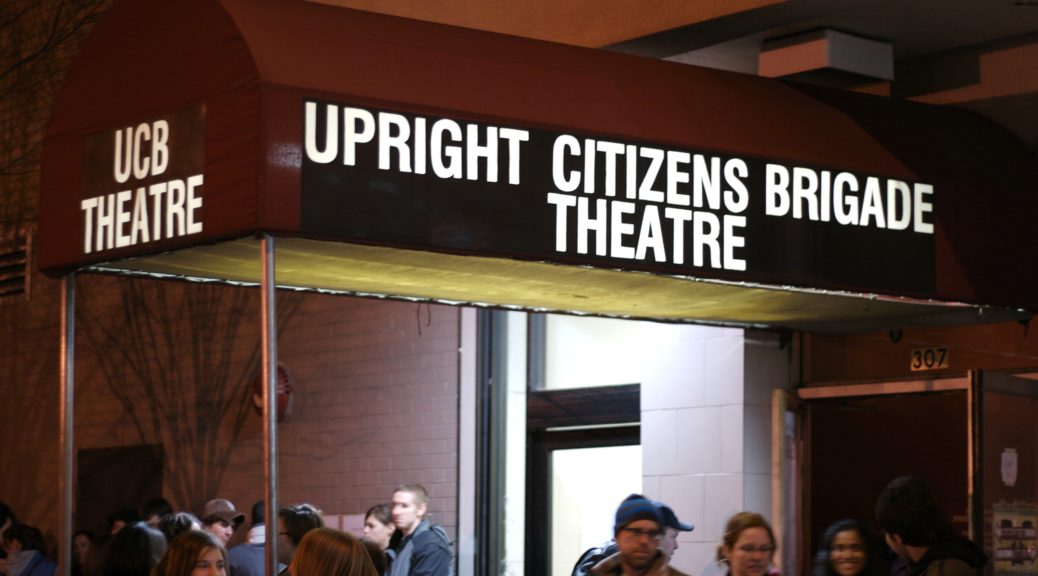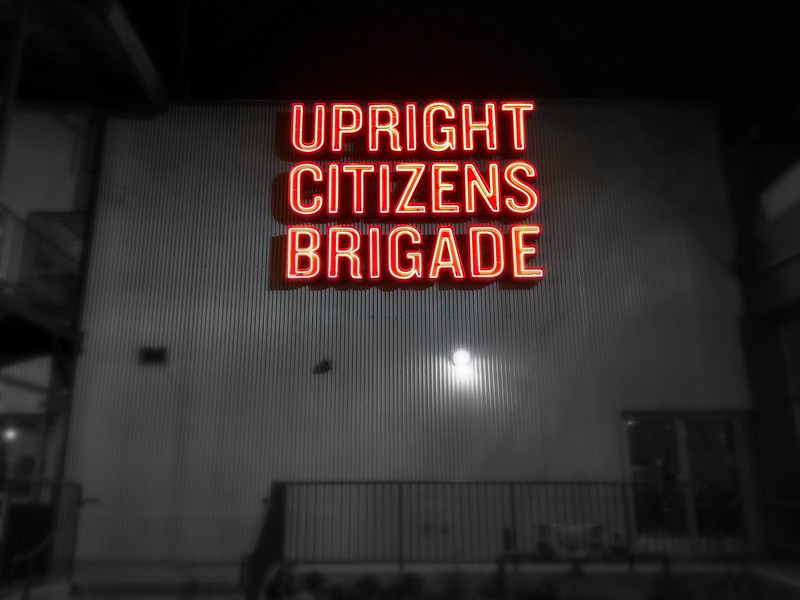By Shelly Hacco
“Don’t Think”, a UCB School of Improv motto, is a simple phrase, yet a way of life for its students and members. But, let’s back up a moment; this first sentence has most likely already created some questions in your head.
- What is UCB?
- What the heck is “improv”?
- What do you mean “Don’t Think”? I am a student; I need to think to graduate!
To begin, improv, short for improvisation, is a form of unscripted acting; it’s when actors go off the page and trust their instincts and their scene partners to form a full scene (a story with a beginning, middle, and end) from scratch. Many movies, mostly comedy (but some dramatic) have actually used improvised dialogue in their final cuts, so, odds are, you have already seen improv in action but never knew it. UCB, short for Upright Citizens Brigade, is a school that trains actors, comedians, and even folks in need of a fun hobby, how to be successful improvisers.
Alright, so improvisers make up scenes as they go… ok… wouldn’t they need to THINK to do that? The answer is no. Thinking is actually the death of good improv, or at least that’s what I’m beginning to understand as I trudge my way through UCB’s frightening, yet exhilarating, Improv 101 course.
There are many improv schools that teach actors the mechanics of improvisation, but there’s only one that appropriates “Don’t Think” as its model. I have been a fan of UCB since their break-out Comedy Central TV show, a collection of short comedic scenes, or “sketches”, in which the four main actors each play a variety of kooky characters. These sketches are based on improv work that was created through theatre performances and classwork. Though I was introduced to this form of comedy and this particular troupe through the TV show, my love for UCB tripled when I saw them live on stage in New York City and then in LA. What’s so impressive about this troupe of improvisers is that, even with their success in TV and film, the members of UCB continue their craft in a theatre setting and provide instruction for others to follow their lead. What more, to this day most of the original actors still perform weekly shows, and bring in rising and established comedians to do the same. These shows are either free or very cost-friendly; we’re talking $5-$10 max. Examples of some of their shows include:
- The Facebook Show – The cast members will pick a volunteer from the audience. They will project that person’s Facebook profile on the screen and chat about the posts, the friends, and the pictures they see. This is often very entertaining in itself but then the cast will improvise hilarious scenes based on that person’s Facebook page.
- Soundtrack – Songs that are taken from audience members’ iPods or music devices inspire genius comedic scenes.
- ASSSSCAT – The original members, plus all-star comedy guests, perform what is known as the “Harold,” a long-form improv structure that is inspired from a one word suggestion from an audience member.
After years of laughing from the sidelines, I decided it was my time to enroll in a class and see where it would take me. It was not an easy step; I actually persuaded my friend AJ to sign up with me. I figured that even if I wasn’t any good, at least I would have a friend to keep me company. Starting from the first class, I realized I had nothing to worry about, not yet at least. The 101 course is for all beginners and really only teaches the building blocks of improvisation. Simple rules like “Yes, and” informed me of not only the formula for a successful improv scene, but also a sure fire way to strike up a conversation and make new friends in real life.
What’s “Yes, and”? Good question. When working with a scene partner, you never want to negate (or disagree) with something that has already been established, so you always want to say YES. So even if your partner says, “Wow honey, you have a tyrannosaurus rex on your head,” you have to say, “Yes, I do!” But not only do you have to say “Yes”, you also have to add new information. So in the previous example, I would say, “Yes, I bought this baby dinosaur on the black market. They have all kinds of extinct animals for sale.” So suddenly, this scene is about extinct animals on the black market. Where will it lead? Who knows, but I bet it will be interesting!
So how does this “Yes, and” business help me make new friends in real life? Well, if you think about it, every successful conversation involves two people adding to a dialogue through “Yes, and.” For instance, I say “I like scuba diving.” To this, you might answer, “I like scuba diving too. Once I went to Australia and scuba’ed through the Great Barrier Reef.” Then I would say “I’ve never been to Australia but I have been to Catalina where they also have great scuba excursions and USC’s Wrigley Institute.” And then the conversation goes on but each person is adding new information onto what the last person said.
Of course, there’s so much more to the art of improvisation and it takes a lot of practice to excel at this surprisingly intellectual art form but I think it’s worth learning and definitely worth seeing. I highly recommend everyone to check out at least one of the many daily shows they offer! See here for their weekly schedule: UCB Theatre
Featured image by Marcin Wichary on Flickr
Shelly Hacco works at the USC American Language Institute as the Office Manager. Shelly also heads the ALI Conversation Groups and the One-on-One Conversation Partner programs. Shelly holds a B.A. from USC’s School of Theater (with a minor in Business Administration) and a Masters from USC’s Liberal Studies Program. She enjoys reading, crafting, traveling, and performing in theatre productions across LA.


